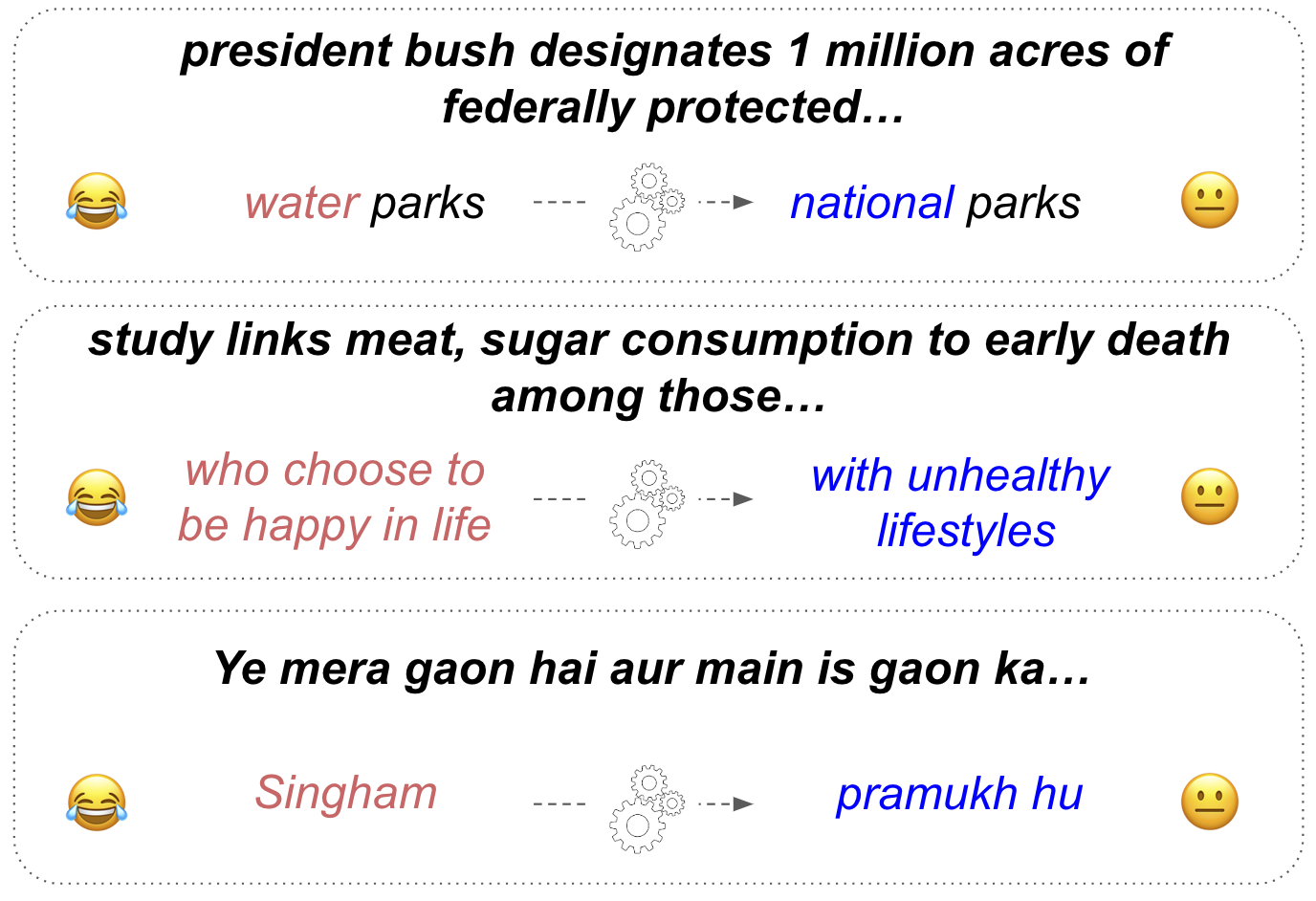Getting Serious about Humor: Crafting Humor Datasets with Unfunny Large Language Models

0

Sign in to get full access
This summary was produced with help from an AI and may contain inaccuracies - check out the links to read the original source documents!
Related Papers


0
Getting Serious about Humor: Crafting Humor Datasets with Unfunny Large Language Models
Zachary Horvitz, Jingru Chen, Rahul Aditya, Harshvardhan Srivastava, Robert West, Zhou Yu, Kathleen McKeown
Humor is a fundamental facet of human cognition and interaction. Yet, despite recent advances in natural language processing, humor detection remains a challenging task that is complicated by the scarcity of datasets that pair humorous texts with similar non-humorous counterparts. In our work, we investigate whether large language models (LLMs), can generate synthetic data for humor detection via editing texts. We benchmark LLMs on an existing human dataset and show that current LLMs display an impressive ability to 'unfun' jokes, as judged by humans and as measured on the downstream task of humor detection. We extend our approach to a code-mixed English-Hindi humor dataset, where we find that GPT-4's synthetic data is highly rated by bilingual annotators and provides challenging adversarial examples for humor classifiers.
Read more6/24/2024
🔮

0
Towards Multimodal Prediction of Spontaneous Humour: A Novel Dataset and First Results
Lukas Christ, Shahin Amiriparian, Alexander Kathan, Niklas Muller, Andreas Konig, Bjorn W. Schuller
Humor is a substantial element of human social behavior, affect, and cognition. Its automatic understanding can facilitate a more naturalistic human-AI interaction. Current methods of humor detection have been exclusively based on staged data, making them inadequate for real-world applications. We contribute to addressing this deficiency by introducing the novel Passau-Spontaneous Football Coach Humor (Passau-SFCH) dataset, comprising about 11 hours of recordings. The Passau-SFCH dataset is annotated for the presence of humor and its dimensions (sentiment and direction) as proposed in Martin's Humor Style Questionnaire. We conduct a series of experiments employing pretrained Transformers, convolutional neural networks, and expert-designed features. The performance of each modality (text, audio, video) for spontaneous humor recognition is analyzed and their complementarity is investigated. Our findings suggest that for the automatic analysis of humor and its sentiment, facial expressions are most promising, while humor direction can be best modeled via text-based features. Further, we experiment with different multimodal approaches to humor recognition, including decision-level fusion and MulT, a multimodal Transformer approach. In this context, we propose a novel multimodal architecture that yields the best overall results. Finally, we make our code publicly available at https://www.github.com/lc0197/passau-sfch. The Passau-SFCH dataset is available upon request.
Read more7/9/2024


0
Humor in AI: Massive Scale Crowd-Sourced Preferences and Benchmarks for Cartoon Captioning
Jifan Zhang, Lalit Jain, Yang Guo, Jiayi Chen, Kuan Lok Zhou, Siddharth Suresh, Andrew Wagenmaker, Scott Sievert, Timothy Rogers, Kevin Jamieson, Robert Mankoff, Robert Nowak
We present a novel multimodal preference dataset for creative tasks, consisting of over 250 million human ratings on more than 2.2 million captions, collected through crowdsourcing rating data for The New Yorker's weekly cartoon caption contest over the past eight years. This unique dataset supports the development and evaluation of multimodal large language models and preference-based fine-tuning algorithms for humorous caption generation. We propose novel benchmarks for judging the quality of model-generated captions, utilizing both GPT4 and human judgments to establish ranking-based evaluation strategies. Our experimental results highlight the limitations of current fine-tuning methods, such as RLHF and DPO, when applied to creative tasks. Furthermore, we demonstrate that even state-of-the-art models like GPT4 and Claude currently underperform top human contestants in generating humorous captions. As we conclude this extensive data collection effort, we release the entire preference dataset to the research community, fostering further advancements in AI humor generation and evaluation.
Read more6/18/2024


0
Can Pre-trained Language Models Understand Chinese Humor?
Yuyan Chen, Zhixu Li, Jiaqing Liang, Yanghua Xiao, Bang Liu, Yunwen Chen
Humor understanding is an important and challenging research in natural language processing. As the popularity of pre-trained language models (PLMs), some recent work makes preliminary attempts to adopt PLMs for humor recognition and generation. However, these simple attempts do not substantially answer the question: {em whether PLMs are capable of humor understanding?} This paper is the first work that systematically investigates the humor understanding ability of PLMs. For this purpose, a comprehensive framework with three evaluation steps and four evaluation tasks is designed. We also construct a comprehensive Chinese humor dataset, which can fully meet all the data requirements of the proposed evaluation framework. Our empirical study on the Chinese humor dataset yields some valuable observations, which are of great guiding value for future optimization of PLMs in humor understanding and generation.
Read more7/8/2024